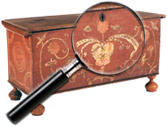|
|
The Anna Pottery of Union County, Illinois
Cornwall Kirkpatrick, brother Wallace, and father Andrew, relocated to Anna, Union County, Illinois from Mound City, Illinois in the winter of 1858 and fired their first ware the following spring. Andrew senior was a potter born in Washington County, Pennsylvania and worked there and in Knox County, Ohio before moving further west to Illinois. Between 1859 and 1896 his sons built and operated a large stoneware pottery [...] Click here to continue reading.
English Spatterware Pottery
Spatterware is an early 19th century English china pottery made in the Staffordshire region and known for its colorful “spattered” or “stippled” decoration. Pieces were decorated in one to five colors, usually arranged in stripes or concentric bands. The colors often bordered another decorative device, such as a peafowl, schoolhouse, fort, etc. Today these devices have given their names to the pattern designations used by collectors. The most rare decorative forms [...] Click here to continue reading.
Irish Belleek Porcelain
The story of Belleek porcelain began in 1857 when Mr. John Caldwell Bloomfield of County Firmanagh noted that the whitewash used on his tenants’ houses was exceptionally brilliant. This led to the discovery of a limepit on his Castle Caldwell estate (the source of the whitewash) and the ultimate discovery that the whole estate rested upon a felspathic clay stratum. Some say that due to the severe deterioration of the estate, [...] Click here to continue reading.
Ceramics Marked Hand-Painted
Caution should be exercised in evaluating ceramics marked “hand-painted”. A standard nineteenth century practice, and on in to the twentieth century, was to decorate china and other porcelains with transfers, adding a few minor brushstrokes and marking the piece “hand-painted” thus gaining prestige and premium prices. Genuinely hand-painted porcelains are seldom marked as such. Their hand-painted decoration is apparent from brush-strokes, the irregular borders of decorative elements and use of a [...] Click here to continue reading.
Hutschenreuther Porcelain
At the beginning of the 19th century, a young porcelain painter from Thuringia went in search of the “white gold”. His name: Carl Magnus Hutschenreuther, a visionary with courage to explore. It was in north-east Bavaria that he was lucky.
Here he found the “china clay” (or kaolin) for porcelain and a new home. In 1814, just 20 years of age, he founded the first modern and private porcelain factory in Bavaria. [...] Click here to continue reading.
Dutch and English Delftware
The seventeenth century has been described as the great age of maritme trade with faraway places. During the first quarter of the century – labeled the Golden Age in Holland – the Dutch began trading with the Chinese in the highly prized exotic imports of porcelains. This new mania drove the potters in the Netherlands to make tin-glazed earthenwares that borrowed heavily from Chinese forms and decorative motifs. Later in [...] Click here to continue reading.
Sawankhalok Stoneware
The ancient walled city of Sawankhalok, located about 200 miles north of Bangkok was a major pottery center in the 14th and 15th centuries. A modern city of the same name is located nearby with a population exceeding 30,000.
More than two hundred pottery kilns are known to have operated in the region and a number have been excavated in modern times. The principal type of ware is a grayish-white stoneware covered [...] Click here to continue reading.
|
Recent Articles
- Charles Alfred Meurer – American Artist & Tromp L’Oeil Artist
- Sendak, Maurice – American Artist & Writer
- Godie, Lee – American Artist
- Davis, Vestie – American Artist
- Bartlett, Morton – American Artist
- Mackintosh, Dwight – American Artist
- Evans, Minnie Jones – African-American Artist
- Mumma, Ed (Mr. Eddy) – American Artist
- Nice, Don – American Artist
- Savitsky, John (Jack) – American Artist
- Gordon, Harold Theodore (Ted) – American Artist
- Dial, Thornton – African-American Artist
- Doyle Sam – American Artist
- Johnson, Lester Frederick – American Artist
- Finster, Howard – American Artist
|
|
